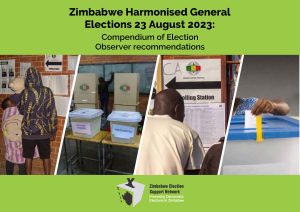AS the country gears up for the 2023 harmonized elections, the Zimbabwe Election Support Network (ZESN) convened a virtual training workshop for 41 freelance journalists on 13 June 2022 to strengthen their capacities on election reporting as well as raise awareness on key electoral processes. The chief objective of the training workshop dubbed “Media training on electoral processes” was to equip them with knowledge of aspects of the whole electoral cycle and ensure that their reportage covers beyond polling day activities only.
In her opening remarks, the Acting ZESN Executive Director, Ellen Dingani, underscored the imperative role the media play as important electoral stakeholders in educating the masses on voter and political rights which in turn
allows citizens to participate in electoral processes and make informed decisions.
